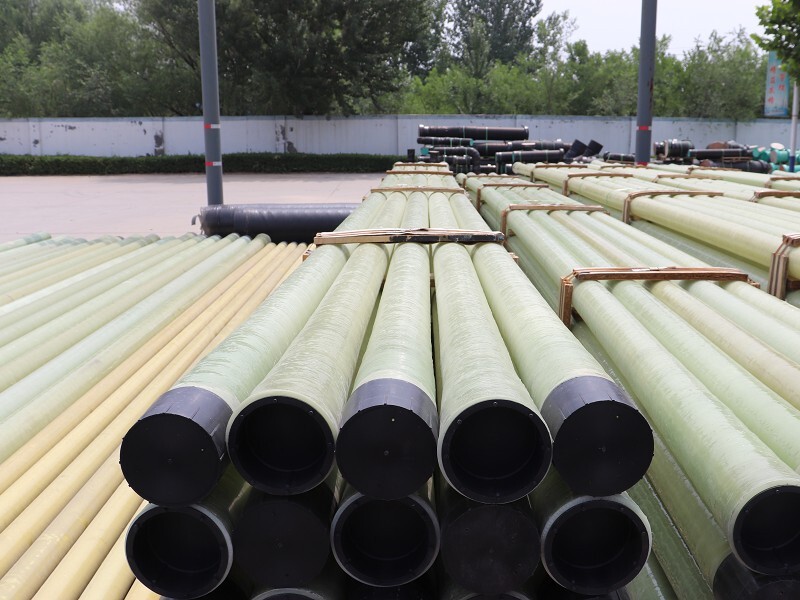
-
Excellent corrosion resistance: Coping with complex municipal environments.
Municipal pipelines are often exposed to corrosive media, such as acidic substances in domestic sewage, chemicals in industrial wastewater, and salt in deicing agents. Traditional metal pipes are prone to electrochemical corrosion, leading to leakage, secondary water pollution and other problems. GRE pipes are based on epoxy resin and reinforced with glass fiber. They are extremely chemically inert and can resist long-term corrosion from acids, alkalis, salts and organic solvents. For example, in sewage treatment plants, GRE pipes can withstand corrosion from corrosive gases such as hydrogen sulfide; in urban roads where deicing agents are frequently used in winter, their salt corrosion resistance is significantly better than that of steel pipes.
-
Excellent hydraulic performance: improve water delivery efficiency
The efficiency of the municipal water supply system directly affects the stability of urban water supply and drainage. The inner wall of the GRE pipe is smooth (Hazen-Williams coefficient ≥ 150), and the friction resistance is much lower than that of concrete pipes (coefficient of about 100) and cast iron pipes, which can reduce the head loss by 20%-30%. For example, in the municipal water supply network, the use of GRE pipes can reduce the energy consumption of pumping stations. Taking a system with a daily water supply of 100,000 tons as an example, it can save hundreds of thousands of yuan in electricity bills each year.
In addition, the smooth inner wall can also inhibit scale deposition and microbial attachment, avoiding pipe blockage problems. This feature is particularly important in rainwater discharge and sewage transportation,which can reduce the frequency of silt removal and ensure the long-term water flow capacity of the pipe network.
-
Lightweight and high strength: adaptable to complex construction environments
Municipal engineering projects often involve complex underground terrain (such as urban underground integrated pipe corridors and traffic-intensive areas). Traditional metal pipes are heavy, require heavy machinery for installation, and have low construction efficiency. The density of GRE pipes is only 1/4 of that of steel pipes, but its tensile strength is close to that of steel, and has the following advantages:
Quick installation: lightweight design increases lifting and handling efficiency by 50%, especially suitable for narrow or deep buried construction environments;
-
III. Lightweight and high strength: adaptable to complex construction environments
-
Life cycle economy: significant long-term cost advantages
Please give us a message
产品介绍产品介绍产品介绍产品介绍产品介绍产品介绍产品介绍产品介绍产品介绍产品介绍产品介绍产品介绍产品介绍产品介绍产品介绍产品介绍产品介绍产品介绍产品介绍产品介绍产品介绍产品介绍产品介绍产品介绍产品介绍产品介绍产品介绍产品介绍产品介绍产品介绍
Please give us a message
产品介绍产品介绍产品介绍产品介绍产品介绍产品介绍产品介绍产品介绍产品介绍产品介绍产品介绍产品介绍产品介绍产品介绍产品介绍产品介绍产品介绍产品介绍产品介绍产品介绍产品介绍产品介绍产品介绍产品介绍产品介绍产品介绍产品介绍产品介绍产品介绍产品介绍
Please give us a message
产品介绍产品介绍产品介绍产品介绍产品介绍产品介绍产品介绍产品介绍产品介绍产品介绍产品介绍产品介绍产品介绍产品介绍产品介绍产品介绍产品介绍产品介绍产品介绍产品介绍产品介绍产品介绍产品介绍产品介绍产品介绍产品介绍产品介绍产品介绍产品介绍产品介绍
Please give us a message
产品介绍产品介绍产品介绍产品介绍产品介绍产品介绍产品介绍产品介绍产品介绍产品介绍产品介绍产品介绍产品介绍产品介绍产品介绍产品介绍产品介绍产品介绍产品介绍产品介绍产品介绍产品介绍产品介绍产品介绍产品介绍产品介绍产品介绍产品介绍产品介绍产品介绍
